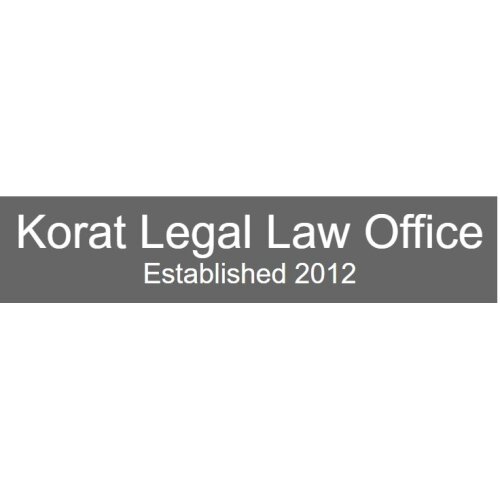Best Commercial Real Estate Lawyers in Nakhon Ratchasima
Share your needs with us, get contacted by law firms.
Free. Takes 2 min.
Free Guide to Hiring a Real Estate Lawyer
List of the best lawyers in Nakhon Ratchasima, Thailand
Thailand Commercial Real Estate Legal Articles
Browse our 7 legal articles about Commercial Real Estate in Thailand written by expert lawyers.
- 5 Common Legal Pitfalls in Thai Real Estate and How to Avoid Them
- Nestled within the paradisiacal landscapes and burgeoning economic dynamism of Thailand lies a high-stakes real estate market rife with both rapturous potential and formidable legal complexities. This idyllic Southeast Asian terrain has emerged as a globally-coveted destination for luxury residential developments, commercial property investments, and ambitious real estate endeavors spanning... Read more →
- How Foreigners Can Own Property in Thailand
- For foreigners considering property ownership in Thailand, understanding the process and relevant laws is crucial. These laws are not typically compared to the property ownership laws of other countries, as the Kingdom strictly regulates which foreigners can own property, the circumstances under which they can do so, and the types... Read more →
- Tax Implications of Buying Property in Thailand: A Comprehensive Guide
- You might be an expat in Thailand hunting for your next property investment, and interested in buying a condo in one of the world’s fastest-moving cities, Bangkok; or perhaps you’re an investor who is also in awe of the stunning and ever-popular vacation island of Phuket, or a retiree considering... Read more →
About Commercial Real Estate Law in Nakhon Ratchasima, Thailand
Nakhon Ratchasima, often known as Korat, is one of Thailand's major commercial hubs in the northeastern region. The commercial real estate market here has been experiencing growth, spurred by increased infrastructure development and urbanization. Commercial real estate in Nakhon Ratchasima includes properties such as office buildings, retail spaces, industrial properties, and high-rise commercial complexes. Legal practices in this area involve regulations on property transactions, zoning, land use, tenant-landlord agreements, and more. Knowing the intricacies of these laws ensures smoother business transactions and protects legal rights.
Why You May Need a Lawyer
There are several scenarios in which one might seek legal advice in the field of commercial real estate. These situations include:
- Purchasing or leasing commercial property and needing contract reviews to ensure terms are fair and legally sound.
- Navigating zoning laws and obtaining necessary permits for property development or modification.
- Resolving disputes related to property boundaries, conditional sales agreements, or breach of contract.
- Protecting your interests when dealing with tenant negotiations or disputes.
- Ensuring compliance with environmental regulations and land use policies.
An experienced lawyer can offer invaluable guidance and representation, safeguarding your assets and interests.
Local Laws Overview
Commercial real estate law in Nakhon Ratchasima is influenced by both national Thai laws and local regulations. Key aspects include:
- Zoning Laws: These dictate how land may be used, including restrictions on modifications and commercial activities permitted in particular areas.
- Land Ownership: Foreign investors must be aware of ownership restrictions and may need guidance on structuring their investments, as generally, foreigners cannot own land in Thailand directly.
- Lease Agreements: Specific laws regulate the terms and enforcement of commercial leases, often requiring detailed documentation.
- Construction Permissions: Developers must obtain various permits and ensure compliance with building codes and safety regulations.
- Environmental Regulations: Compliance with environmental impact assessments may be necessary, especially for large projects.
Frequently Asked Questions
What is the process for buying commercial property in Nakhon Ratchasima?
Purchasing commercial property typically involves negotiating a sale contract, conducting due diligence to verify property details, and transferring ownership, usually in the presence of a legal professional to ensure compliance with Thai property laws.
Can foreigners own commercial property in Nakhon Ratchasima?
While foreigners cannot own land outright in Thailand, they can own buildings and may enter long-term leases or establish a Thai company to purchase land, provided conditions are met.
What legal documents are crucial for commercial real estate transactions?
Critical documents include sale and purchase agreements, title deeds, due diligence reports, and zoning compliance certificates. All documents should be reviewed by a legal expert.
How are property disputes typically resolved?
Disputes may be settled through negotiation, mediation, arbitration, or litigation, depending on the nature of the conflict and the willingness of parties to reach an agreement.
What are the common types of commercial leases available?
Common lease types in Thailand include fixed-term leases and periodic leases. Terms can be complex and should be closely reviewed to protect both landlord and tenant interests.
Are there penalties for not complying with zoning laws?
Yes, non-compliance with zoning laws can result in fines, forced adjustments to the property, or even legal action. It’s crucial to adhere to local zoning requirements.
What role does a lawyer play in commercial lease agreements?
A lawyer can negotiate terms, ensure lawful compliance, clarify tenant/landlord responsibilities, and handle any legal disputes that arise during the lease period.
Is it necessary to conduct a land survey before purchase?
Yes, conducting a land survey is advisable to confirm property boundaries and check for any encroachments or legal restrictions not evident from paperwork alone.
What taxes are involved in commercial real estate transactions?
Taxes can include transfer fees, stamp duties, and withholding tax on capital gains. The specifics can vary, so it is important to consult a tax professional.
How can I verify legitimate property ownership?
Verification involves checking the title deed at the local land office to ensure it is legitimate, free from encumbrances, and matches the seller's identity.
Additional Resources
Consider reaching out to the following for assistance:
- Department of Lands: For information on title deeds and land ownership.
- Local Land Office in Nakhon Ratchasima: For land registration and enquiry.
- Thai Real Estate Association: Provides resources and networking for those in the real estate sector.
- Board of Investment (BOI) Thailand: Offers guidelines for foreign investment in real estate.
Next Steps
If you need legal assistance in commercial real estate, here are some steps you should take:
- Consult a Local Attorney: Seek a lawyer experienced in Thai commercial real estate to guide you through the complexities of local laws and transactions.
- Conduct Research: Learn about the specific property laws applicable to your case, keeping local zoning and building regulations in mind.
- Engage in Due Diligence: Verify all property details, including ownership and compliance with local laws before moving forward with transactions.
- Seek Professional Help: For financial and investment advice, especially if you are a foreign investor navigating the Thai real estate market for the first time.
Understanding and utilizing the available resources will ensure well-informed decisions in your commercial real estate ventures in Nakhon Ratchasima.
Lawzana helps you find the best lawyers and law firms in Nakhon Ratchasima through a curated and pre-screened list of qualified legal professionals. Our platform offers rankings and detailed profiles of attorneys and law firms, allowing you to compare based on practice areas, including Commercial Real Estate, experience, and client feedback.
Each profile includes a description of the firm's areas of practice, client reviews, team members and partners, year of establishment, spoken languages, office locations, contact information, social media presence, and any published articles or resources. Most firms on our platform speak English and are experienced in both local and international legal matters.
Get a quote from top-rated law firms in Nakhon Ratchasima, Thailand — quickly, securely, and without unnecessary hassle.
Disclaimer:
The information provided on this page is for general informational purposes only and does not constitute legal advice. While we strive to ensure the accuracy and relevance of the content, legal information may change over time, and interpretations of the law can vary. You should always consult with a qualified legal professional for advice specific to your situation.
We disclaim all liability for actions taken or not taken based on the content of this page. If you believe any information is incorrect or outdated, please contact us, and we will review and update it where appropriate.









